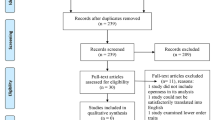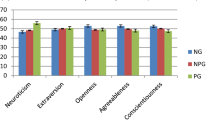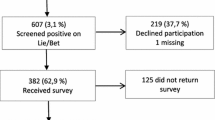Abstract
The present study explored relationships between personality domains and gambling forms in individuals with and without probable pathological gambling (PPG). Associations among personality domain scores obtained from the NEO Personality Inventory-Revised, endorsements of gambling activities on the South Oaks Gambling Screen (SOGS), and PPG as determined by the SOGS were examined with bivariate and logistic regression analyses. Compared to recreational gamblers, those with PPG scored significantly higher in neuroticism and lower in agreeableness and conscientiousness. Agreeableness was inversely associated with gambling on cards, sports, bingo, stock market, dice, and skill games. Conscientiousness was inversely associated with gambling on sports and animal racing. Extraversion was positively associated with gambling on cards, dice, and stocks. Neuroticism and openness were positively associated with gambling on animal racing and stock gambling, respectively. Significant interactions indicated stronger inverse associations between agreeableness and gambling in casinos, on sports, and on skill games and stronger positive associations between openness and gambling on stocks and skill games in individuals with PPG compared to those without. The results suggest different relationships between personality domain measures and specific forms of gambling in individuals with and without PPG. Future research efforts should examine how personality factors may be used to enhance policy, prevention, and treatment efforts.
Similar content being viewed by others
References
Alessi, S. M., & Petry, N. M. (2003). Pathological gambling severity is associated with impulsivity in a delay discounting procedure. Behavioural Processes, 64, 345–354.
Bagby, R. M., Vachon, D. D., Bulmash, E. L., Toneatto, T., Quilty, L. C., & Costa, P. T. (2007). Pathological gambling and the five-factor model of personality. Personality and Individual Differences, 43, 873–880.
Breen, R. B., & Zuckerman, M. (1999). Chasing in gambling behavior: Personality and cognitive determinants. Personality and Individual Differences, 27, 1097–1111.
Chou, K., & Afifi, T. O. (2011). Disordered (pathologic or problem) gambling and Axis I psychiatric disorders: Results from the National Epidemiologic Survey on Alcohol and Related Conditions. American Journal of Epidemiology, 173, 1289–1297.
Costa, P. T., & McCrae, R. R. (1992). Revised NEO personality inventory (NEO-PI-R) and NEO five-factor inventory (NEO-FFI) professional manual. Odessa, FL: Psychological Assessment Resources Inc.
Coventry, K. R., & Brown, R. I. F. (1993). Sensation seeking, gambling and gambling addictions. Addiction, 88, 541–554.
Cunningham-Williams, R. M., Cottler, L. B., Compton, W. M., III, & Spitznagel, E. L. (1998). Taking chances: Problem gamblers and mental health disorders: Results from the St. Louis Epidemiological Catchment Area Study. American Journal of Public Health, 88, 1093–1096.
Desai, R. A., & Potenza, M. N. (2008). Gender differences in the association between gambling problems and psychiatric disorders. Social Psychiatry and Psychiatric Epidemiology, 43, 173–183.
DeYoung, C. G. (2006). Higher-order factors of the Big Five in a multi-informant sample. Journal of Personality and Social Psychology, 91, 1138–1151.
Dickerson, M., Hinchy, J., & Fabre, J. (1987). Chasing, arousal and sensation seeking in off-course gamblers. British Journal of Addiction, 82, 673–680.
Dixon, M. R., Jacobs, E. A., & Sanders, S. (2006). Contextual control of delay discounting by pathological gamblers. Journal of Applied Behavior Analysis, 39, 413–422.
Estevez, A., Herrero-Fernandez, D., Sarabia, I., & Jauregui, P. (2015). The impulsivity and sensation-seeking mediators of the psychological consequences of pathological gambling in adolescence. Journal of Gambling Studies, 31, 91–103.
Fang, X., & Mowen, J. C. (2009). Examining the trait and functional motive antecedents of four gambling activities: Slot machines, skilled card games, sports betting, and promotional games. Journal of Consumer Marketing, 26, 121–131.
Gambino, B., & Lesieur, H. (2006). The South Oaks Gambling Screen (SOGS): A rebuttal to critics. Journal of Gambling Issues, 17, 1–16.
Gerstein, D., Hoffman, J., Larison, C., Engelman, L., Murphy, S., Palmer, A., et al. (1999). Gambling impact and behavior study. Chicago: National Opinion Research Center, University of Chicago.
John, O. P., Naumann, L. P., & Soto, C. J. (2008). Paradigm shift to the integrative big five trait taxonomy: History, measurement, and conceptual issues. In O. P. John, R. R. Robins, & L. A. Pervin (Eds.), Handbook of personality: Theory and research (3rd ed., pp. 114–158). New York: Guilford.
Kessler, R. C., Hwang, I., LaBrie, R., Petukhova, M., Sampson, N. A., Winters, K. C., et al. (2008). The prevalence and correlates of DSM-IV pathological gambling in the national comorbidity survey replication. Psychological Medicine, 38, 1351–1360.
Kuley, N. B., & Jacobs, D. F. (1988). The relationship between dissociative-like experiences and sensation seeking among social and problem gamblers. Journal of Gambling Behavior, 4, 197–207.
Ladouceur, R., Lachance, S., & Fournier, P. M. (2009). Is control a viable goal in the treatment of pathological gambling? Behavior Research and Therapy, 47, 189–197.
Lesieur, H. R., & Blume, S. B. (1987). The South Oaks Gambling Screen (SOGS): A new instrument for the identification of pathological gamblers. The American Journal of Psychiatry, 144, 1184–1188.
Lorains, F. K., Cowlishaw, S., & Thomas, S. A. (2011). Prevalence of comorbid disorders in problem and pathological gambling: Systematic review and meta-analysis of population surveys. Addiction, 106, 490–498.
MacLaren, V. V., Best, L. A., Dixon, M. J., & Harrigan, K. A. (2011a). Problem gambling and the five factor model in university students. Personality and Individual Differences, 50, 335–338.
MacLaren, V. V., Fugelsang, J. A., Harrigan, K. A., & Dixon, M. J. (2011b). The personality of pathological gamblers: A meta-analysis. Clinical Psychology Review, 31, 1057–1067.
Mayfield, C., Perdue, G., & Wooten, K. (2008). Investment management and personality type. Financial Services Review, 17, 219–236.
McCrae, R. R., & Costa, P. T. (2003). Personality in adulthood, a five-factor theory perspective (2nd ed.). New York: Guilford Press.
McDaniel, S. R., & Zuckerman, M. (2003). The relationship of impulsive sensation seeking and gender to interest and participation in gambling activities. Personality and Individual Differences, 35(6), 1385–1400.
Miller, J. D., MacKillop, J., Fortune, E. E., Maples, J., Lance, C. E., Campbell, W. K., et al. (2013). Personality correlates of pathological gambling derived from big three and big five personality models. Psychiatry Research, 206, 50–55.
Myrseth, H., Pallesen, S., Molde, H., Johnsen, B. H., & Lorvik, I. M. (2009). Personality factors as predictors of pathological gambling. Personality and Individual Differences, 47, 933–937.
National Research Council. (1999). Pathological gambling: A critical review. Washington, DC: National Academy Press.
Pantalon, M. V., Maciejewski, P. K., Desai, R. A., & Potenza, M. N. (2008). Excitement-seeking gambling in a nationally representative sample of recreational gamblers. Journal of Gambling Studies, 24, 63–78.
Parke, A., Griffiths, M., & Irwing, P. (2004). Personality traits in pathological gambling: Sensation seeking, deferment of gratification and competitiveness as risk factors. Addiction Research & Theory, 12, 201–212.
Petry, N. M. (2005). Pathological gambling: Etiology, comorbidity, and treatment. Washington DC: American Psychological Association.
Petry, N. M., Stinson, F. S., & Grant, B. F. (2005). Comorbidity of DSM-IV pathological gambling and other psychiatric disorders: Results from the National Epidemiological Survey on Alcohol and Related Conditions. Journal of Clinical Psychiatry, 66, 564–574.
Potenza, M. N., Steinberg, M. A., McLaughlin, S. D., Wu, R., Rounsaville, B. J., & O’Malley, S. S. (2001). Gender-related differences in the characteristics of problem gamblers using a gambling helpline. American Journal of Psychiatry, 158, 1500–1505.
Potenza, M. N., Steinberg, M. A., Skudlarski, P., Fulbright, R. K., Lacadie, C. M., Wilber, M. K., et al. (2003). Gambling urges in pathological gamblers: An fMRI study. Archives of General Psychiatry, 60, 828–836.
Skinner, B. F. (1974). About behaviorism. New York: Knopf.
Vachon, D. D., & Bagby, R. M. (2009). Pathological gambling subtypes. Psychological Assessment, 21, 608–615.
Whiting, S. W., & Dixon, M. R. (2015). Examining contextual control in roulette gambling. Journal of Applied Behavior Analysis, 48, 204–208.
Yan, W. S., Zhang, R. R., Lan, Y., Li, Y. H., & Siu, N. (2016). Comparison of impulsivity in non-problem, at-risk and problem gamblers. Scientific Reports. https://doi.org/10.1038/srep39233.
Funding
This work was supported by NIDA (R01 DA019039, RL1 AA017539), the VA VISN1 MIRECC, the National Center for Responsible Gambling (Center of Excellence Grant), the Connecticut Council on Problem Gambling and the Connecticut Department of Mental Health and Addiction Services.
Author information
Authors and Affiliations
Corresponding author
Ethics declarations
Conflict of interest
The authors report no conflicts of interests with respect to the content of this manuscript. Dr. Potenza has received financial support or compensation for the following. Dr. Potenza has consulted for Shire, Jazz Pharmaceuticals, Opiant/Lightlake Pharmaceuticals, and RiverMend Health; has received research support from Mohegan Sun Casino and the National Center for Responsible Gaming; has participated in surveys, mailings or telephone consultations related to addictions, impulse control disorders or other health topics; has consulted for or advised law offices and gambling entities on issues related to impulse control disorders; has provided clinical care in the Connecticut Department of Mental Health and Addiction Services Problem Gambling Services Program; has performed grant reviews for the National Institutes of Health and other agencies; has edited journals or journal sections; has given academic lectures in grand rounds, CME events and other clinical or scientific venues; and has generated books or book chapters for publishers of mental health texts.
Informed Consent
The study was approved by the Human Investigation Committee of the Yale University School of Medicine. All subjects provided written informed consent prior to participating in the study.
Rights and permissions
About this article
Cite this article
Whiting, S.W., Hoff, R.A., Balodis, I.M. et al. An Exploratory Study of Relationships Among Five-Factor Personality Measures and Forms of Gambling in Adults With and Without Probable Pathological Gambling. J Gambl Stud 35, 915–928 (2019). https://doi.org/10.1007/s10899-018-9809-4
Published:
Issue Date:
DOI: https://doi.org/10.1007/s10899-018-9809-4




